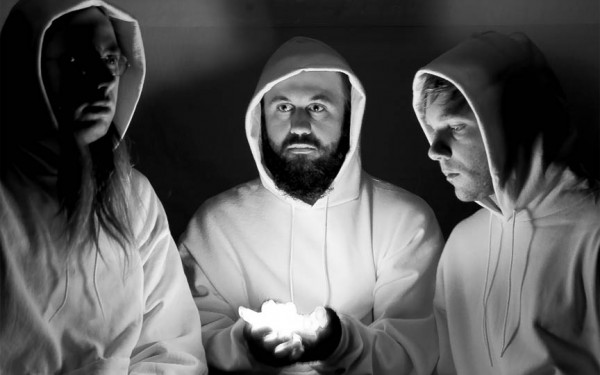CROSSS Hones New Crafts
Andy March is a Closet Inventor with a Love for His Record Lathe
The mystic indie metal of CROSSS is coming to Montreal before taking its new form in Toronto at the end of the year.
Originally from Halifax, singer and guitarist Andy March credits his interest in things spiritual in part to his time at a Shambhala Buddhist high school.
It may also be where his chant-like vocals come from, moving over slow, heavy guitar riffs and relentless drumming.
March has just finished mixing the follow-up to last year’s heavy haunt Obsidian Spectre. The new record was tracked on familiar territory, during night sessions in Halifax’s Echo Chamber studio throughout 2014.
Like on Obsidian Spectre, he’s doing all the production work, from the engineering to the mixing to the mastering.
“It just takes forever. It kind of drives a person crazy trying to engineer and mix and master a record, and I think it probably dilutes its meaning, having to pass through the same brain so many times,” says March, who started CROSSS in 2008 in Montreal.
It’s common practice to have someone else master your record, but mastering is expensive, so March spent months last year training his ears to notice the minutiae that mastering engineers make their living from.
The resulting Obsidian Spectre was something you could crank without being overwhelmed, giving the songs more space, in the ’70s style of recording.
“That one I felt went a little too far, it’s a little too gentle and comfortable. This record hits you a little harder, it’s not as easy listening,” says March.
“It’s kind of in the middle, it’s not going to sound like a Ty Segall record, but it’s not going to sound like a Black Sabbath record either.”
He’s going for something heavier, with lyrics that are a little more relatable, while retaining the dark, druidic quality that makes a CROSSS record feel part grunge and part sacrament.
The record will be a kind of second half to Obsidian Spectre and is expected to come out in the late winter or early spring.
The latest release from CROSSS is Eyes Seance, one of two songs recorded in the latest Echo Chamber sessions written by Nathan Doucet, who plays drums in CROSSS and has his own project under the name Heaven for Real.
Doucet and bassist Ryan Allen have been the main band for the past two years, but after touring this fall with a temporary lineup, March will have a new band based in Toronto—with Mikołaj Gajewski on bass and Kris Bowering on drums.
Lathe ‘em Up
Eyes Seance came out last month on Ottawa-based Bruised Tongue Records, typically a cassette-only operation. But thanks to a deal with March when he was making a hasty exit from Hamilton, Bruised Tongue has put out a handful of lathe cut records using March’s record lathe.
Bruised Tongue co-founder Pierre Richardson cut 100 records with March’s lathe, available through Bruised Tongue.
Lathe cut records are cut using a lathe (surprise), an old machine that makes impressions on rotating objects. Before tape recording, electric lathes were used to cut records onto plastic.
“I didn’t know where I was going to put my machine,” says March. “I have a few requirements, because it’s kind of big, and it makes a bit of a smell and uses a lot of power.”
He was able to make an arrangement with Richardson to store his record lathe in a backroom of Gabba Hey!, a rehearsal and living space in central Ottawa. In exchange for storage and being able to come down a few days to work with the lathe, March showed Richardson how to cut records.
“The technology is still ancient, but there’s an online community of people and we were all experimenting over the last three years, and it just got to a place where it sounds really good, it’s consistent and doesn’t wear out,” says March.
Lathe cut records are made one at a time, so they’re only really ideal for rare and short-run releases. They’re known for inconsistent sound and short lifespan, but March says his records can be played on repeat for days on end without any change in quality.
Sandwiching art between two thin pieces of plastic, he creates his own short-run picture discs.
“There’s just like a lot of variables and there ended up being some pretty intense modifications to the machine [involved],” says March.
Along with other experimenters around the world, March found using hard, smooth plastic and adjusting the lathe would lead to more reliable cuts.
“A couple of the developments I discovered by just staring at the machine for hours and hours,” he laughs.
“I’m a bit of a closet inventor, I’ve worked on a couple things that I’ve tried to bring to market, and it was really exciting to see it take off. I kind of have a way to make money off it, which is pretty amazing.”
He’s working out an arrangement to bring the lathe to Toronto, where it would be moved to June Records, March offering his lathe services through the store.
“I’m pretty excited about it, it’s been a long time since I’ve had a job,” says March. “I’m excited to see if I can popularize it a little bit.”
CROSSS // POP Montreal // Telephone Explosion Showcase: Sept. 18, 9 p.m. at Club Lambi (4465 St. Laurent Blvd.) // Craft Singles Showcase: Sept. 19, 9 p.m. at Brasserie Beaubien (73 Beaubien St. W.) // $10





